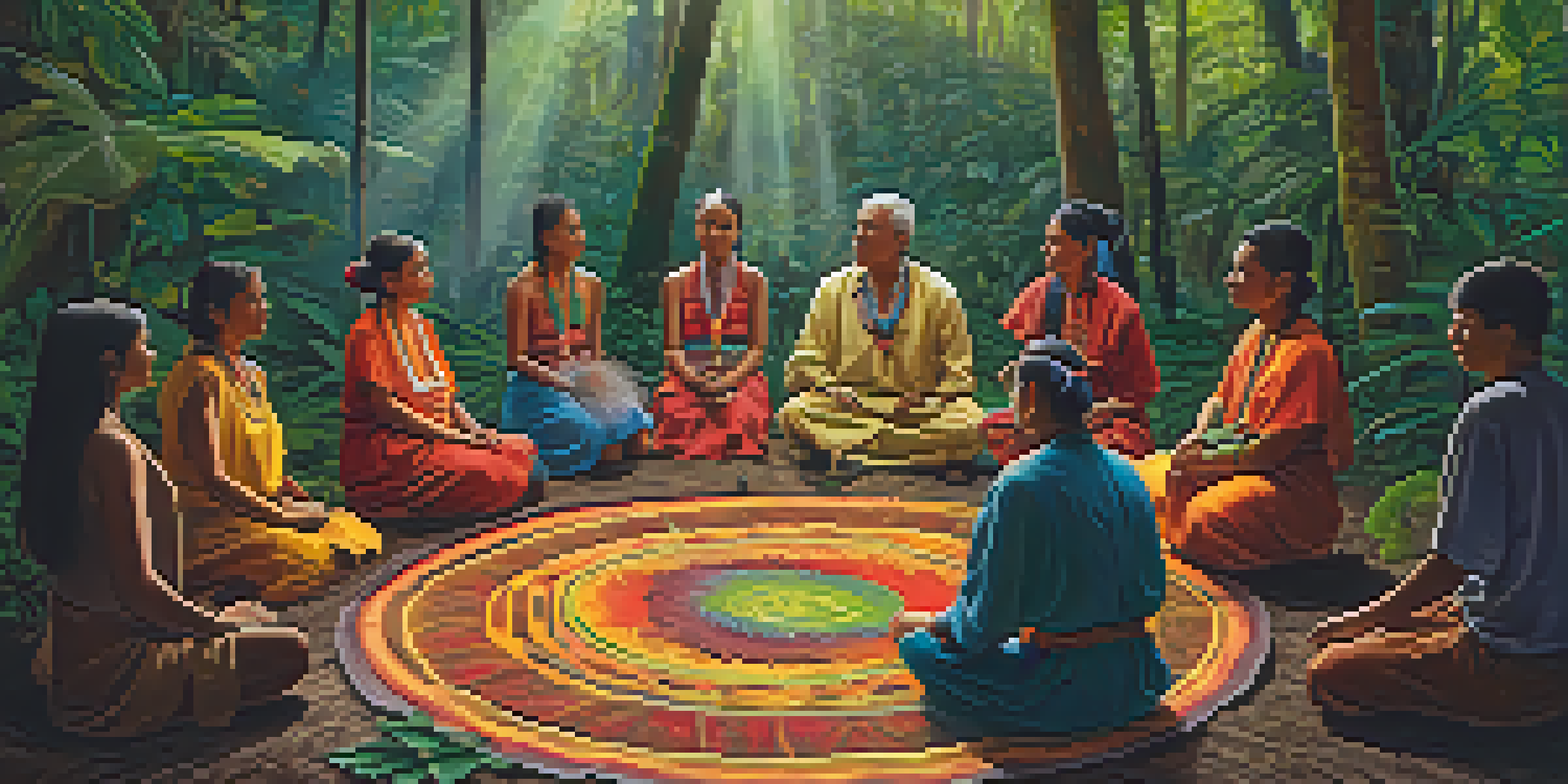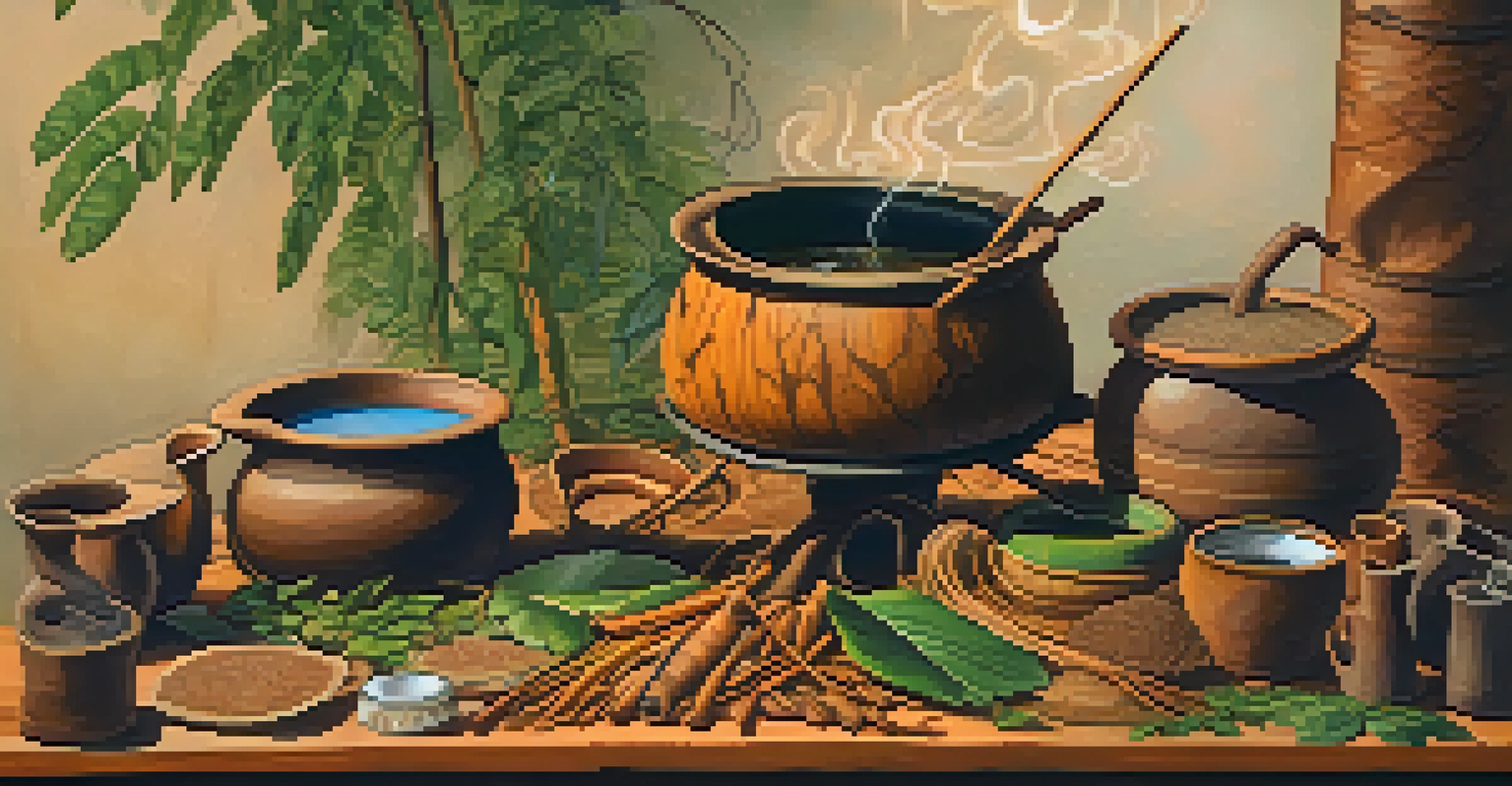Ethical Considerations in Ayahuasca Healing Practices

Understanding Ayahuasca and Its Cultural Significance
Ayahuasca is a powerful plant medicine used traditionally by indigenous tribes in the Amazon. This brew has gained popularity worldwide for its potential to facilitate deep healing and self-discovery. However, understanding its cultural roots is essential to appreciating its significance and respecting its use.
The greatest gift of the ayahuasca experience is the opportunity to see ourselves more clearly and to heal the wounds of our past.
For the indigenous peoples, ayahuasca is not just a substance; it embodies spiritual beliefs, community bonding, and ancestral wisdom. When individuals from outside these cultures seek ayahuasca experiences, they must recognize and honor these traditions. This respect forms the foundation of ethical ayahuasca practices.
Related Resource
Moreover, cultural appropriation becomes a concern when elements of indigenous practices are taken without acknowledgment or understanding. By learning about the cultural significance of ayahuasca, individuals can approach its use with the necessary reverence and awareness.
The Role of Informed Consent in Ayahuasca Retreats
Informed consent is a crucial ethical principle in any therapeutic setting, including ayahuasca retreats. Participants should fully understand what they are engaging in, including potential risks and benefits. This transparency helps ensure that individuals are making educated decisions about their participation.

Retreat facilitators have a responsibility to provide comprehensive information about ayahuasca, its effects, and the context of the ceremony. This includes discussing the possible psychological impacts and physical health considerations. Clear communication fosters a safe environment where participants can feel secure in their choices.
Cultural Significance of Ayahuasca
Understanding and respecting the cultural roots of ayahuasca is essential for ethical practices and honoring indigenous traditions.
Additionally, informed consent goes beyond initial agreements; it should be an ongoing conversation throughout the retreat. Continuous dialogue allows participants to express concerns or discomfort, ensuring their autonomy and well-being are respected.
Ensuring Safety and Well-Being During Ceremonies
Safety is paramount in ayahuasca ceremonies, which can be intense and transformative experiences. Facilitators must be prepared to handle medical emergencies and psychological crises that may arise. Proper screening of participants' health conditions can mitigate potential risks associated with ayahuasca consumption.
In the end, we all have to take responsibility for our own healing. Ayahuasca can guide us, but the work is ours to do.
Furthermore, creating a supportive environment during the ceremony is essential. This includes providing adequate supervision, ensuring participants feel comfortable, and fostering a sense of community. When participants feel safe, they are more likely to engage deeply with their experiences and benefit from the healing potential of ayahuasca.
Related Resource
Ultimately, the responsibility lies with retreat organizers to prioritize participant safety. This commitment not only enhances the ceremony experience but also builds trust within the community.
Respecting Indigenous Knowledge and Practices
Indigenous knowledge surrounding ayahuasca is rich and complex, often passed down through generations. Respecting this knowledge means acknowledging its origins and valuing the wisdom of those who have used ayahuasca for healing. This respect is essential to ethical practice, ensuring that indigenous voices are heard and honored.
Collaborating with indigenous healers can provide invaluable insights into the proper use of ayahuasca and its spiritual significance. Such partnerships promote cultural exchange rather than exploitation, enriching the experiences of all involved. Participants can learn not just about the substance but also about the cultural practices that accompany its use.
Safety and Informed Consent
Ensuring participant safety and informed consent are critical in ayahuasca retreats, fostering a secure and respectful environment.
By respecting indigenous knowledge, we contribute to the preservation of these traditions and support the communities that have maintained them. This ethical approach fosters a deeper connection between participants and the healing practices they engage in.
Addressing Exploitation and Commercialization of Ayahuasca
The rising popularity of ayahuasca has led to concerns about its commercialization and exploitation. As more retreats spring up, it’s important to question whether they genuinely prioritize healing or merely seek profit. This commercialization can dilute the spiritual and cultural significance of ayahuasca, undermining its traditional uses.
Ethical facilitators strive to create affordable and accessible experiences that honor the roots of ayahuasca. They should seek to offer fair compensation to indigenous practitioners and ensure that profits benefit local communities. By prioritizing ethical practices, these facilitators can help maintain the integrity of ayahuasca healing.
Related Resource
Participants also play a role by choosing retreats that demonstrate a commitment to ethical standards. Doing research and asking the right questions can help ensure that their experiences are respectful and meaningful.
Professional Training for Ayahuasca Facilitators
The role of an ayahuasca facilitator is both significant and complex, requiring a deep understanding of the medicine and the ceremonial context. Professional training for facilitators can enhance their ability to support participants effectively, ensuring a safe and respectful environment. This training should encompass both the psychological and spiritual dimensions of the practice.
Ethical facilitators should also engage in ongoing education about the cultural aspects of ayahuasca use. This commitment to learning demonstrates respect for indigenous knowledge and helps facilitators navigate the challenges of modern practices. A well-trained facilitator can guide participants through their experiences with empathy and understanding.
Community's Role in Healing
Building a supportive community is vital for enhancing the healing journey, helping participants integrate their experiences effectively.
Ultimately, investing in professional development for facilitators contributes to the overall integrity of ayahuasca healing practices. It ensures that participants receive the support they need while honoring the traditions that surround this powerful medicine.
The Importance of Community Support in Healing Journeys
Community plays a vital role in the healing journeys facilitated by ayahuasca. Participants often find strength and encouragement in shared experiences, fostering connections that can last long after the retreat. Nurturing these relationships creates a supportive network that enhances the healing process.
Moreover, community support can help individuals integrate their ayahuasca experiences into their everyday lives. Sharing insights and challenges with others who understand can be incredibly beneficial. This ongoing support can help mitigate any difficult emotions or realizations that may arise post-ceremony.

Facilitators should encourage the formation of community bonds, both during and after retreats. By prioritizing community, the healing journey becomes a collective experience, enriching the lives of all involved.
Considering Long-Term Impacts of Ayahuasca Use
The long-term impacts of ayahuasca use are an essential ethical consideration that often goes overlooked. While many seek ayahuasca for immediate healing, understanding the potential long-term effects is crucial for informed decision-making. This awareness can help participants navigate their journeys with a clearer sense of purpose and responsibility.
Research into the psychological and spiritual benefits of ayahuasca is still evolving, but many users report ongoing personal growth and transformation. However, some may experience challenges that require continued support. Acknowledging these potential long-term impacts encourages a more holistic view of ayahuasca healing.
Ultimately, ethical practices in ayahuasca use involve consideration of not just immediate outcomes but also lasting effects. By fostering a thoughtful approach, participants can engage more deeply with their healing journeys.